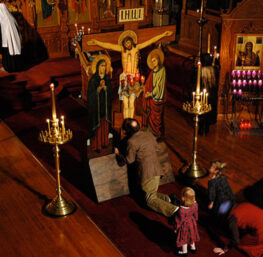 Catholic Online –
Catholic Online –
Suffering, even of the just, can really be transformed into a ‘blessing’ if it becomes the occasion for God to intervene directly into our lives.
Moved by human suffering, Jesus healed many who were sick and cast out unclean spirits. What the readings tell us is not just that suffering can be healed. In the second reading St Paul explains the possibility for each of us to participate in the saving work of Christ. We can truly help to combat suffering by a life dedicated to the untiring proclamation of the Gospel. —
The first reading of the liturgy of the Word has the theme of innocent suffering through the figure of the righteous man Job, who, almost disheartened and greatly tried, raises his cry to heaven seeing the hard work and transience of his life. Job raises the deeply enigmatic question of the suffering of the just which, at the end of the passage, remains almost in suspense awaiting a response from on high.
The problem reappears in the pages of the Gospel which also describes the mystery of physical suffering. There we find the figure of Peter’s mother-in-law, who is ill with a fever. It is in this context that an answer is finally given by Jesus – not with a theoretical explanation, but with a gesture. Jesus did not talk to the sick woman, but comes to her, lifts her up, takes her by the hand and then, as the Scriptures tell us, “immediately the fever left her”.
In this way, Jesus doesn’t explain human suffering. Instead he acts silently, with a physical gesture full of meaning that is rooted in the inexhaustible mystery of the Incarnation. He touches the woman, he lifts her, he takes her hand. It is a direct gesture which reveals the deep and perfect participation of Jesus in human suffering which is embodied in Peter’s mother-in-law.
Jesus offers the definitive answer to the question asked by Job. He participates in human suffering, He shares it, He counters it and He overcomes it. The action of Jesus is truly salvific, so much so that the people of Capernaum came crowding to Peter’s door. Moved by human suffering, Jesus healed many who were sick and cast out unclean spirits.
What the readings tell us, however, is not just that suffering can be healed. In the second reading St Paul explains the possibility for each of us to participate in the saving work of Christ. We can truly help to combat suffering by a life dedicated to the untiring proclamation of the Gospel.
Like the Apostle, every Christian is called to work in the ‘vineyard of the Lord’. We are called to work as part of the Church ‘at any cost’. We do this in a particular way by asking the Lord, if it is useful for their eternal salvation, that someone’s physical illnesses might be healed.
We can therefore collaborate with the healing of those who have sufferings of an interior or spiritual nature. Our lives should be an example to others of holiness and faithfulness. They should challenge the world around us and show that Christians give a concrete answer to the problem of evil, even as they continue to face trials by asking for the power of the Spirit to overcome them.
Suffering, even of the just, can really be transformed into a ‘blessing’ if it becomes the occasion for God to intervene directly into our lives. It is a blessing if it leads us to contemplate the participation and closeness of God to our existence. It is a blessing, above all, if it leads us to offer in ourselves what is still to be made up in the sufferings of Christ so that we participate in a mysterious, but real way, in the work of universal salvation.
We pray to the Blessed Virgin Mary, who knew what it was to suffer, and particularly what it meant to suffer alongside her beloved son, that by Divine Providence we may obtain the light and strength needed to live our lives with the same faith as that of the Mother who stood by the cross.
HT: Catholic Online



